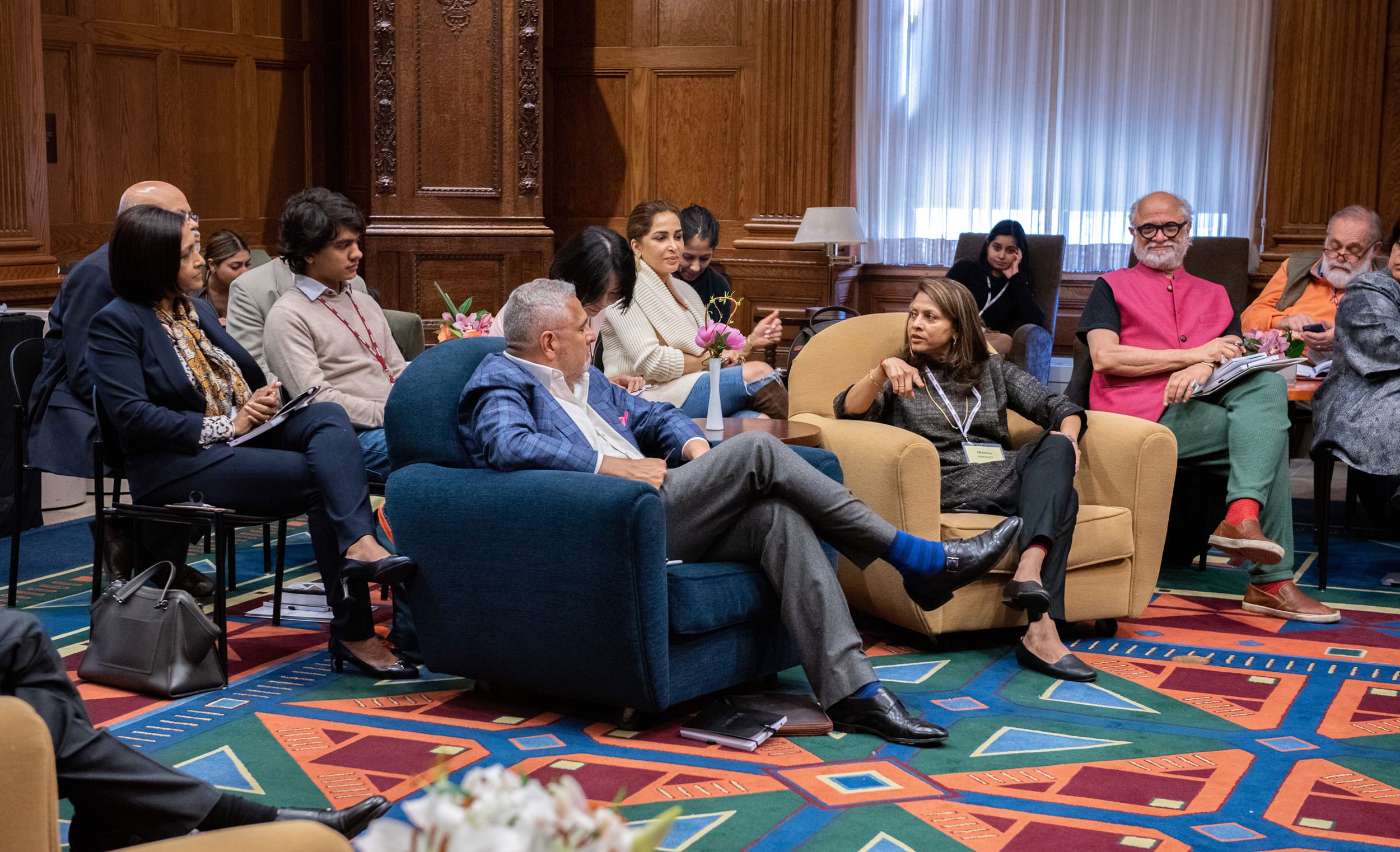
Participants of the Mittal Institute’s Annual Cambridge Symposium.
Last week, the Mittal Institute held its 2019 Annual Cambridge Symposium, welcoming supporters and Harvard faculty to a series of discussions on the Mittal Institute’s and Harvard’s scholarship on science and technology, health, arts, and education in South Asia. With a lively group and a full roster of experts to speak on each topic, participants explored everything from robotics to art conservation in South Asia and identified four significant needs of the region.
Invest in South Asia’s Science and Technology
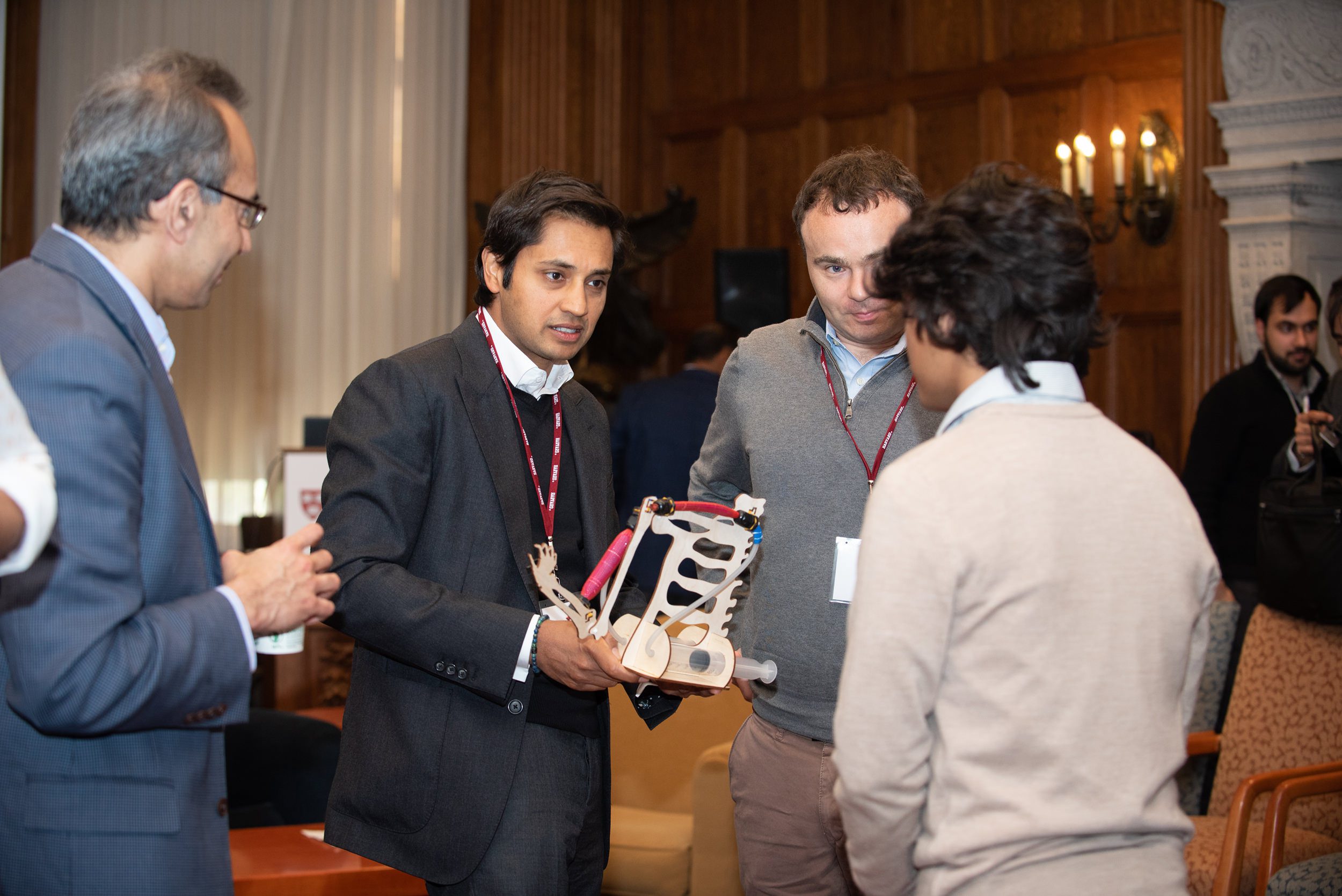
Aditya Mittal observes a Soft Robotics Toolkit developed by Professor Conor Walsh’s Toolkit team.
The first session focused on several aspects of science and technology: education, application, and policy. Muhammad Zaman, Howard Hughes Medical Institute Professor at Boston University, discussed the issues that education in the pure sciences faces. “The training is not great enough to give back to society. Many who have had the exposure to higher studies are still unemployed,” he said.
And those who study STEM (science, technology, engineering, and mathematics) don’t always end up in academia, noted Sheila Jasanoff, Pforzheimer Professor of Science and Technology Studies at the Harvard Kennedy School. “A number of them are going into careers in business, management, administration, and so on,” she said. “About 50 percent of them learn that STEM is not for them after a couple months of the course. So, it’s important to find other options for these young, bright students.”
One of these options is the Mittal Institute’s B4 Program. “We have funding to conduct hands-on training by Harvard faculty for post-docs from India. The program is working, so the challenge now is to scale it up,” said Venki Murthy, Professor of Molecular and Cellular Biology. His work with the Mittal Institute’s B4 Program brings Indian postdoctoral students who are studying science to Cambridge to explore their research focus and work with a faculty mentor.
But investment in scientific education needs to start early, which is what Conor Walsh, Gordon McKay Professor of Engineering and Applied Sciences at the John A. Paulson School of Engineering and Applied Sciences, and his Soft Robotics Toolkit team are working toward. “We have a kit that a high school teacher can use to teach students the engineering of robotics and its application. Most robotics focus on the programming side, but there’s a gap in the building part. So, we’re trying to fill the gap by providing the students with stuff that is ‘made.’”
Understand Modern and Past Humanitarian Concerns
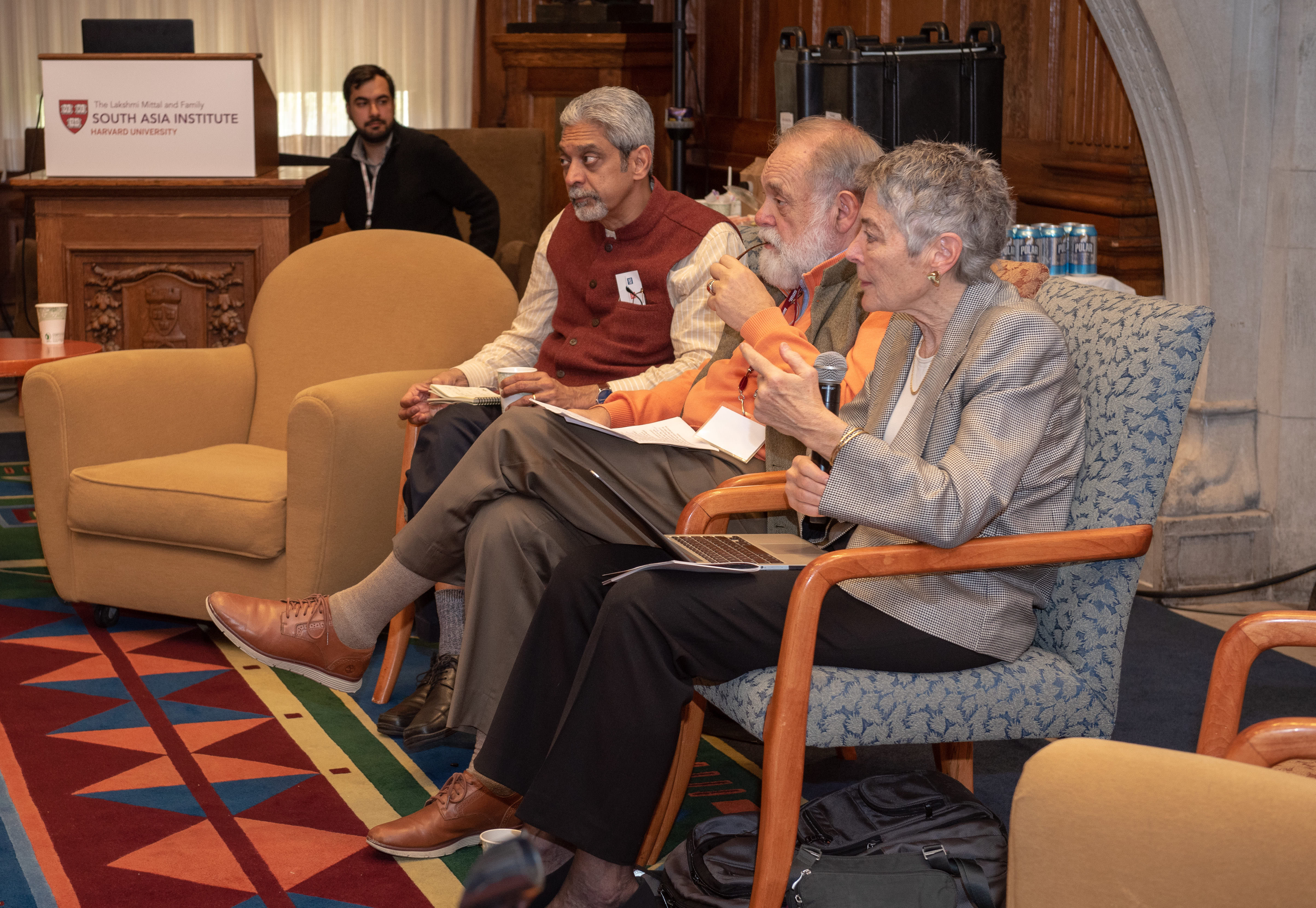
From left to right: Dr. Vikram Patel, Dr. Richard Cash, and Dr. Jennifer Leaning speak about health in South Asia.
Jennifer Leaning, François-Xavier Bagnoud Professor of the Practice of Health and Human Rights at Harvard T. H. Chan School of Public Health, opened the discussion on health in South Asia by exploring the aftermath of the 1947 Partition of British India. “There were many humanitarian conditions that needed to be attended to: The refugee camps were full. The roads were clogged with people, food trucks, and so on. There were outbursts of cholera, smallpox. A shortage of food and clean water led to starvation. The mortality rate shot up,” she said. The Mittal Institute’s research on the Partition, led by Dr. Leaning, delves into the demographic and humanitarian consequences of the Partition, the temporality of refugee camps and settlements established for Partition migrants, and more.
“Boundaries have no meaning when it comes to environmental factors.” — Dr. Richard Cash, Senior Lecturer on Global Health, Harvard T.H. Chan School of Public Health
Additionally, modern issues have arisen that threaten the health of people living in South Asia today. Richard Cash, Senior Lecturer on Global Health at Harvard T.H. Chan School of Public Health, explored the health impacts of a troubled environment. “Throughout North India, Pakistan, and Nepal, the air pollution is so high, to the extent that it reduces the life expectancy of the population by two to three years,” he said. “Cyclones, earthquakes, and more will occur. Global warming is going to dry up the rivers. What are the health impacts? Mortality rates will be high.
Globalize and Preserve South Asian Art
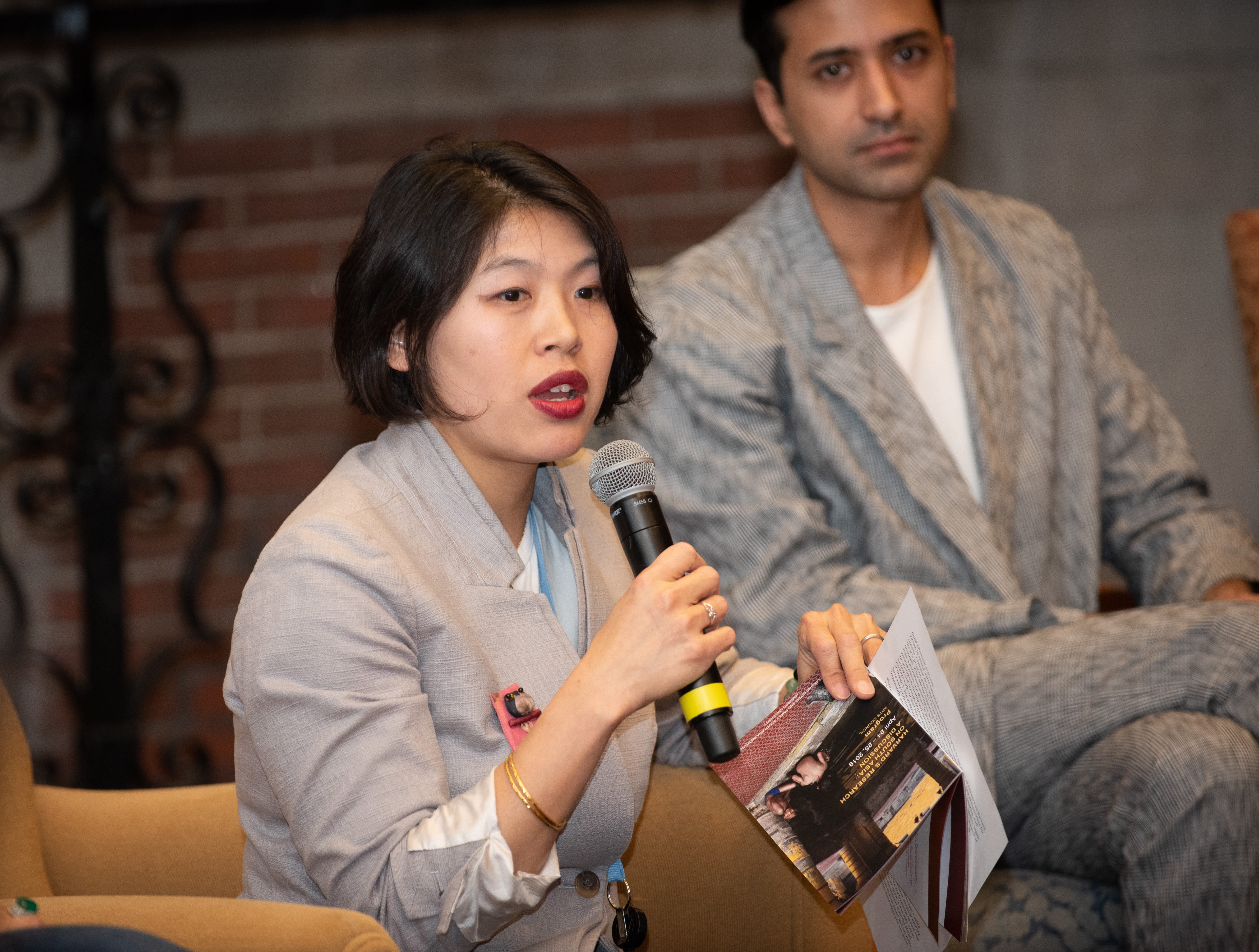
Dr. Jinah Kim (left) and Dr. Shanay Jhaveri (background) on the panel for the Arts session.
The Mittal Institute’s Arts Program brings artists from South Asia to Cambridge each year to engage with the community, students, and Harvard faculty, while expanding on their own research to guide their future work. Jinah Kim, Gardner Cowles Associate Professor of History of Art and Architecture, noted that the fundamental goal of the Visiting Artist Fellowship is to promote the arts of South Asia on the global stage and increase the role of art in society.
Shanay Jhaveri, Assistant Curator (South Asia, Modern and Contemporary Art) at the Metropolitan Museum of Art, explained how the fellowship program provides an opportunity for artists from this region to interact with Harvard faculty and resources, feeding into what they have already been investigating and developing in their work. “The core of the program is to provide opportunity to the artists, to experience a context other than their own,” he said. “There aren’t many other residency programs that provide access to leading academic voices in the field, and that makes it quite distinct from others.”
Moving forward, the Mittal Institute will also continue its work to expand the scholarship on the conservation and preservation of South Asia’s art sites. “There are not enough people to look after these sites,” said Narayan Khandekar, Director of the Straus Center for Conservation and Technical Studies and Senior Conservation Scientist at Harvard Art Museums. “In a recent workshop at CSMVS with 22 delegates from around India, we looked at where conservation has come from, where it is now, and how it can move forward. Out of that conversation were two tangible initiatives: working with a conservation training program, and leadership training for departments and curators to lead their staff and to create better directors.”
Recognize Our Fluid Cultures and Livelihoods
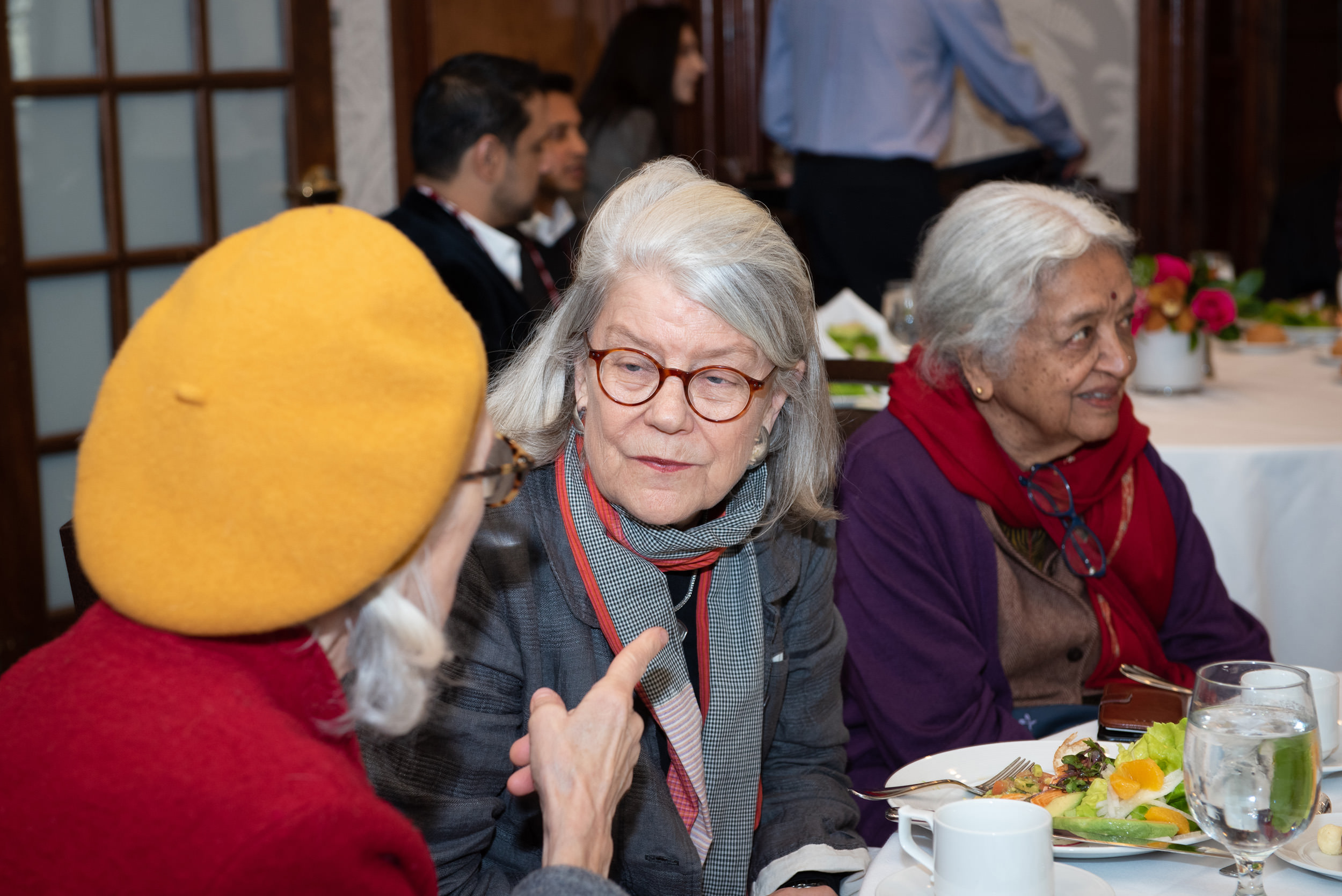
Dr. Diana Eck (center) at the Annual Cambridge Symposium.
“Let me preface this by saying one of the things that has radically changed our world since the early 1990s is the fact that our migration patterns and our access to information have radically changed,” began Diana Eck, Professor of Comparative Religion and Indian Studies, as the discussion turned to education and livelihood in South Asia. With the ease of movement from one part of the world to another and the access to a rich database of knowledge through the internet, a pattern of increased South Asian demography arose in the United States.
“It has made clear in so many ways how the histories of our cultures and nations are inextricably intertwined,” said Dr. Eck. “For the US, there was a rapid relative transformation of our own religious landscape. Hindu communities moved into almost every place in the US and built landmark temples in major cities. How are these traditions and Hindu communities changing in the American religious landscape?”
“This is not a gender issue or a patriarchy issue. It’s an issue of class and economic divide.” — Dr. Martha Chen, Lecturer in Public Policy, Harvard Kennedy School
Martha Chen, another panelist and a Lecturer in Public Policy at Harvard Kennedy School, shifted the conversation to economics and livelihood. Dr. Chen was raised in North India and grew up around informal workers, eventually making her way to Harvard. “I had to find an academic framework for what I did, and that framework was the informal economy. What I came up against was the mainstream economists’ perception of the informal economy, and its association with illegal activities and noncompliance with taxes and regulations,” she said. “But what all of [the informal workers] want is to be recognized as legitimate workers. They want a seat at the policy table.”
With the help of its supporters and Harvard faculty, the Mittal Institute will continue its work to build scholarship and expand the conversation around these important themes throughout South Asia.
